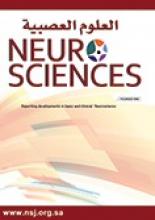Abstract
OBJECTIVE: To study parents’ knowledge and attitude towards children with epilepsy, and to identify contributing factors to negative attitudes.
METHODS: A prospective cross-sectional study including consecutive parents attending the pediatric neurology clinics of King Abdulaziz University Hospital, Jeddah, Saudi Arabia from February to August 2012. A structured 40-item questionnaire was designed to examine their demographics, knowledge, and attitudes.
RESULTS: A total of 117 parents were interviewed, 57% were mothers. The ages of their epileptic children ranged from 1-16 years (median 6.6), mostly boys (65%). Although most parents (70%) felt informed and recognized various treatment modalities, many believed that epilepsy is a mental disorder (48%), correlates with evil (44%), or affects the child’s intelligence (38%). Up to 53% admitted to treating their child differently and avoiding upsetting or punishing him/her. This behavior was less likely if they achieved college education (p=0.01). Some parents (29%) admitted to using non-medical treatments, usually traditional or religious practices. Those parents were more likely to believe that epilepsy is a mental disease (p=0.002), or correlates with evil (p=0.015).
CONCLUSION: The level of knowledge among parents of epileptic children needs improvement. Many have significant misconceptions, negative attitudes, and poor parenting practices. Increased awareness and educational programs are needed to improve the quality of life of these families.
- Copyright: © Neurosciences
Neurosciences is an Open Access journal and articles published are distributed under the terms of the Creative Commons Attribution-NonCommercial License (CC BY-NC). Readers may copy, distribute, and display the work for non-commercial purposes with the proper citation of the original work.






